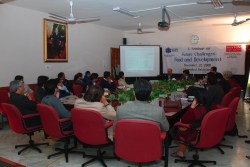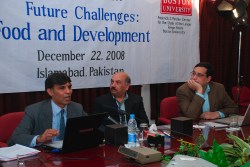Experts Discuss Food and Governance in Islamabad

The Pardee Center, in collaboration with the Sustainable Development Policy Institute, Pakistan co-sponsored its first seminar abroad. This seminar is part of the Center’s new initiative on Food and Sustainable Development, which is supported by the Netherlands Ministry of Agriculture, Land and Food Quality (LNV). Video here.
The seminar was titled Future Challenges: Food and Development. The initiative is part of the Pardee Center’s aim to reach out to developing country partners to create interdisciplinary partnerships on a range of issue concerning the global long-term future. The Center hopes to sponsor other similar events in across developing countries in the upcoming calendar year.
This seminar was held in Islamabad, Pakistan on December 22, 2008. The panelists included Dr. Adil Najam, Director of the Pardee Center, Dr. Abid Quyyum Suleri, Executive Director of the Sustainable Development Policy Institute, and Mr. Sahib-e-Haq, Head of the Vulnerability Analysis and Mapping Unit at the World Food Program, Islamabad.
 Speaking to an audience of some thirty-five experts, civil society workers, and public sector representatives, the panelists debated the link between food security and development in the backdrop of the current global food crisis and the agenda of the upcoming Commission on Sustainable Development 2008-09. The panelists argued that the issue of food security could not be looked at in isolation from broader issues of development. They argued that food insecurity is highly correlated with the state of governance in countries.
Speaking to an audience of some thirty-five experts, civil society workers, and public sector representatives, the panelists debated the link between food security and development in the backdrop of the current global food crisis and the agenda of the upcoming Commission on Sustainable Development 2008-09. The panelists argued that the issue of food security could not be looked at in isolation from broader issues of development. They argued that food insecurity is highly correlated with the state of governance in countries.
Presenting an ongoing Pardee Center study, Dr. Najam argued that global food insecurity seems to be linked to key governance indicators of states. He argued that global trends reveal that the food crisis was trig
gered not just by lack of food but also by poor governance and low human development. His findings suggested that countries with high food insecurity were also the victims of bad governance, they had low rankings in the human development index, and also featured prominently on the failed states index. He also pointed out that while there was a need to improve governance at the local level, in today’s interdependent world, the local had become global in that no local initiative could be completely isolated from the global policy regimes in place. Dr. Najam also warned about the possible negative consequences of climate change on food systems and emphasised that climate change would increase the uncertainty and vulnerability for farming communities the world over.

Focusing primarily on Pakistan, Dr. Suleri concurred with Dr. Najam’s views to a large extent. He presented his thesis of the ‘governance-food insecurity nexus’ arguing that the well-known reasons for the global food price hike – production factors, bio fuels, energy crisis, and climate change – were not responsible for the food crisis and riots in Pakistan. For him, food inflation in the country during 2006-08 was purely a governance issue. He emphasised that food insecurity in a state like Pakistan that is largely self sufficient in production is an indicator of skewed accessibility to food; the heart of the problem lay in politicization of channels that are designed to make food ‘accessible’. In essence, he saw an outright focus on production as misplaced and urged for a holistic policy that took into account not only production, but also availability and accessibility issues.
Mr. Haq of WFP gave an over view of Pakistan’s food crisis in last year and highlighted interventions of World Food Programme to provide relief to the food insecure population. He presented an extremely dim picture, highlighting that the number of chronically food insecure population in Pakistan had risen from 36 million to approximately 45 million (Pakistan’s total population is close to 160 million) in the past year. Like the other two speakers, he blamed much of Pakistan’s food woes on misconstrued policy priorities. Good governance and best practices in agricultural and food marketing policies were stressed as a means to redress the situation.
In the question session that followed the presentations, participants agreed that a sectoral approach to resolving the issue of food security was untenable and that all stakeholders had to approach the issue simultaneously at the global, national, and local levels.
The seminar was widely covered in the Pakistani print and electronic media, including reports in The News, The Daily Times, and Observer. See Video here.